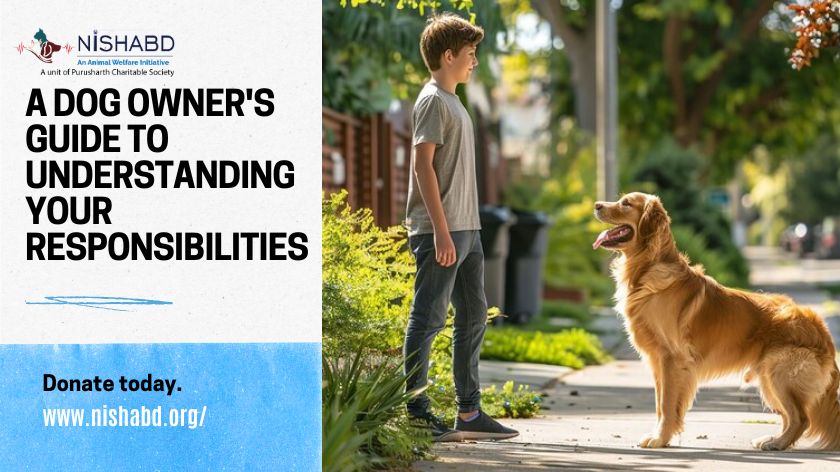A Dog Owner’s Guide to Understanding Your Responsibilities
Being a responsible dog owner is a delight, but it has its own responsibilities. As a dog-owner, you must be aware of and meet the legal requirements to avoid any trouble.
This guide will assist you in understanding the important obligations including vaccination and licensing to laws regarding leashes and the liability. This will help you in being a responsible dog owner.
- Licensing and Registration
The majority of areas require pet owners to register their dogs. The licensing process helps authorities in keeping track of pets and ensures that they are vaccination-free against Rabies.
Why Do You Need to License Your Dog?
- Legal Requirements: Numerous towns and cities have laws which require dogs to be licensed. Infractions could result in penalties.
- Identification: A licensed dog is more easily returned when lost. The tag that you get for your license usually contains a unique number, which is connected to your contact information.
- Proof of Vaccination: The licensing process usually requires evidence of rabies vaccination to ensure that your dog is secure and is not a danger to the health of others.
How to Get Your Dog a License
- Review Local Regulations: Check the requirements of your country or city regarding dog licenses.
- Gather the Documents You Need: Usually, you’ll require evidence of your rabies vaccination, and even other vaccines.
- Pay the Fee: Licensing typically involves paying an amount of money, but this could vary based on factors such as age of your dog and whether it’s neutered or spayed.
- Renew your license annually: Keep track of renewal dates so that your dog’s license is current.
- Health Care and Dog Vaccinations
Maintaining your dog’s health isn’t just an individual responsibility, but an obligation that is legally enforceable. Vaccinations are essential to prevent the spread of disease.
Essential Dog Vaccinations
- Rabies: Legally required in the majority of locations. Rabies is a lethal disease that is transmitted to humans.
- Distemper Parvovirus, as well as Hepatitis: Most often required for licensure and strongly recommended by vets.
- Bordetella (Kennel Cough): Important if your dog is going to be around other dogs, like at dog kennels and boarding parks.
Regular Vet Clinic Visits
Annual Check-ups: Regular veterinary visits will ensure your dog is healthy and current on vaccinations.
Preventative Care: It includes prevention of ticks and fleas treatment for heartworms, dental treatment.
- Leash Laws and the Containment
Leash laws have been put in place to ensure the safety of your dog as well as the safety of your pet.
- Public Spaces: In most cities, dogs must be leashed in public areas. This helps prevent dogs from being a danger to traffic, which can cause accidents, or even threaten people and animals in a hostile way.
- Leash Length: Certain areas have the maximum length of leash. Make sure to check your local laws to make sure you are in place.
Containment of Your Property
- Fencing: Ensure that your yard is secure to stop your dog from fleeing. A well-maintained fence can also protect your dog from stray animals and even people.
- Tethering Laws: Some states have laws governing how long and under what conditions a dog is tied (tied in). Be aware of these laws to avoid penalties and ensure the welfare of your dog.
- Take Care to Clean Up After Your Dog
Cleaning your dog’s mess up isn’t just polite, it’s a lawful obligation in a lot of places.
Why Is It Important?
- Public Health: The dog’s waste can transmit parasites and diseases to humans and other animals.
- Environmental Impact: Dog waste could pollute rivers and cause harm to wildlife.
- Community Courtesy: There is nothing worse than stepping into the dog’s trash. Cleaning up after your pet is a sign of respect for your neighbors and the community.
- You are responsible for your dog’s actions
As a pet owner, you are legally accountable for the behavior of your dog. This is in addition to any injury or damage that your dog could cause.
Understanding Liability
- Injuries and bites: In the event that your dog bites anyone or causes injuries it could make you accountable. It could result in medical costs along with legal costs, as well as the compensation for suffering and pain.
- Property Damage: If your dog injures the property of another then you are accountable for repair costs or replacement.
How to Protect Yourself
- Training and Socialization: Train or socialize the dog in order to minimize the possibility of aggressive or destructive behaviour.
- Insurance: Take into consideration the possibility of liability insurance to assist in covering expenses if your dog is responsible for damage or injury. Certain homeowner’s and renter’s policies offer insurance for dog-related injuries.
- Noise Complaints
Barking dogs that are excessively loud can result in complaints about noise and legal troubles.
Managing Barking
- Identify Triggers: Find out what triggers the dog’s bark, and seek to solve the issues.
- Training: Your dog should be trained to limit unnecessary barking. This could involve teaching commands such as “quiet” or employing positive reinforcement methods.
- Environmental Changes: Offer adequate exercise and mental stimulation in order to lessen the amount of barking that is caused by boredom. Be sure that your dog is relaxed and is not left for prolonged periods.
- The Dog’s Ownership Policy in Rental Properties
If you lease your house There could be additional rules and obligations regarding pet ownership.
Understanding Your Lease
- Pet Policies: Read your lease agreement to learn about any pet policy such as breed restrictions sizes, limits on size, and any additional pet deposits or charges.
- Permission: Make sure you’ve received an official written authorization from the landlord for keeping the dog. Verbal agreements might not stand against the event of a dispute.
Being a responsible tenant
- Respect Property: Keep your dog away from damaging the property rental. This includes scratching, chewing and scrubbing.
- Good Neighbor: Be sure that your dog is properly behaved and doesn’t disturb the other tenants. Make any concerns known promptly and in a responsible manner.
- Traveling with your dog
When you travel with your pet, you must follow specific rules and regulations to ensure safety and conformity with the law.
Car Travel
- Restraints: Make use of appropriate restraints such as car seats, seat belts or barriers to ensure your dog’s safety and to prevent distractions during driving.
- Heat Safety: Don’t leave your dog in a car parked particularly in hot temperatures. It could quickly turn risky and unlawful in many locations.
Public Transportation and accommodation
- Consult Policies: Check the rules for dogs in public transport and in rental or hotel properties. Certain places require certain documents, such as health certificates or records of vaccination.
- Crate Training: Make sure your dog is secure in a crate, if needed for accommodation or travel.
- Understanding Animal Cruelty Laws
Animal cruelty laws exist to safeguard dogs and other animals from neglect and abuse.
What Constitutes Cruelty?
- Food and Shelter: Failure to provide enough food and shelter, as well as water or medical treatment.
- Abuse: Physical harm that is done to a dog, for example hitting or kicking dogs.
- Abandonment: Letting an animal without proper care or in hazardous situations.
Conclusion
Being a responsible dog owner is an enjoyable experience, however it is also a burden. If you are aware of and comply with the legal requirements, it is possible to protect the health and safety of your pet, stay clear of legal troubles and make a positive contribution to your community.

